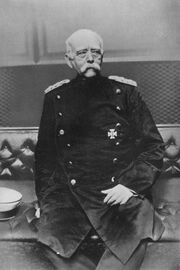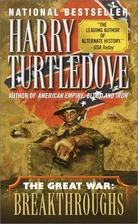GusF (Message Wall | contribs) |
ML4E (Message Wall | contribs) No edit summary |
||
| Line 15: | Line 15: | ||
|type of appearance = Posthumous Reference}}{{Clearright}}{{Southern Victory Historical Character |
|type of appearance = Posthumous Reference}}{{Clearright}}{{Southern Victory Historical Character |
||
| appearance =''[[How Few Remain]]'' |
| appearance =''[[How Few Remain]]'' |
||
| + | | type of appearance = Contemporary references}}{{Clearright}}{{The War That Came Early Historical Character |
||
| ⚫ | |||
| + | |appearance = ''[[Last Orders]]'' |
||
| + | |type of appearance = Posthumous reference |
||
| ⚫ | }}{{Stack end}}'''Otto Eduard Leopold von Bismarck, Count of Bismarck-Schönhausen, Duke of Lauenburg, Prince of Bismarck,''' (1815–1898), was a [[Prussia]]n [[German]] statesman and aristocrat of the 19th century. As Minister-President of Prussia from 1862–1890, he oversaw the unification of Germany. In 1867 he became Chancellor of the North German Confederation. When the second German Empire was formed in 1871, he served as its first Chancellor until 1890, earning the nickname "The Iron Chancellor". As Chancellor, Bismarck held an important role in the German government and greatly influenced German and international politics both during and after his time of service. |
||
== Otto von Bismarck in ''[[In the Presence of Mine Enemies (novel)|In the Presence of Mine Enemies]]'' == |
== Otto von Bismarck in ''[[In the Presence of Mine Enemies (novel)|In the Presence of Mine Enemies]]'' == |
||
| Line 22: | Line 25: | ||
== Otto von Bismarck in [[Southern Victory]] == |
== Otto von Bismarck in [[Southern Victory]] == |
||
Upon the unification of [[Germany#Germany in Southern Victory|Germany]] in 1871, '''Otto von Bismarck''' pursued a foreign policy goal of isolating his country's primary enemy, [[France#France in Southern Victory|France]].<ref>See, e.g., ''[[How Few Remain]]'', pg. 100.</ref> As part of this policy, he empowered his ambassador to [[Philadelphia#Philadelphia in Southern Victory|Philadelphia]], [[Kurd von Schlozer#Kurd von Schlozer in Southern Victory|Kurd von Schlozer]], to negotiate an alliance against France, [[Britain#Britain in Southern Victory|Britain]], and the [[Confederate States#Confederate States in Southern Victory|Confederate States]] (later joined by [[Russia#Russia in Southern Victory|Russia]] and a number of others) with the [[United States#United States in Southern Victory|United States]] that eventually became the [[Central Powers#Central Powers in Southern Victory|Central Powers]] alliance system.<ref>See, Ibid., pgs. 569-571, generally.</ref> |
Upon the unification of [[Germany#Germany in Southern Victory|Germany]] in 1871, '''Otto von Bismarck''' pursued a foreign policy goal of isolating his country's primary enemy, [[France#France in Southern Victory|France]].<ref>See, e.g., ''[[How Few Remain]]'', pg. 100.</ref> As part of this policy, he empowered his ambassador to [[Philadelphia#Philadelphia in Southern Victory|Philadelphia]], [[Kurd von Schlozer#Kurd von Schlozer in Southern Victory|Kurd von Schlozer]], to negotiate an alliance against France, [[Britain#Britain in Southern Victory|Britain]], and the [[Confederate States#Confederate States in Southern Victory|Confederate States]] (later joined by [[Russia#Russia in Southern Victory|Russia]] and a number of others) with the [[United States#United States in Southern Victory|United States]] that eventually became the [[Central Powers#Central Powers in Southern Victory|Central Powers]] alliance system.<ref>See, Ibid., pgs. 569-571, generally.</ref> |
||
| + | |||
| + | == Otto von Bismarck in [[The War That Came Early]] == |
||
| + | When Sgt. [[Alistair Walsh]] had some rather suspect sausages with his chips at an ''estaminet'' in [[Belgium (The War That Came Early)|Belgium]] in 1943, he was reminded of a quote by '''Bismarck''' that "you never wanted to know what went into politics or sausages". Considering his meal, Walsh concluded that Bismarck knew what he was talking about.<ref>''[[Last Orders]]'', pg. 161, HC.</ref> |
||
==References== |
==References== |
||
| Line 42: | Line 48: | ||
{{s-ttl|title=Prime Minister of [[Prussia]] | years=1873–1890}} |
{{s-ttl|title=Prime Minister of [[Prussia]] | years=1873–1890}} |
||
{{End}} |
{{End}} |
||
| − | {{In the Presence of Mine Enemies}} |
+ | {{In the Presence of Mine Enemies}} |
| − | {{Southern Victory}} |
+ | {{Southern Victory}} |
| + | {{The War That Came Early}} |
||
{{DEFAULTSORT:Bismarck, Otto von}} |
{{DEFAULTSORT:Bismarck, Otto von}} |
||
[[Category:Historical Figures]] |
[[Category:Historical Figures]] |
||
| Line 50: | Line 57: | ||
[[Category:Widowed People (OTL)]] |
[[Category:Widowed People (OTL)]] |
||
[[Category:Southern Victory Characters]] |
[[Category:Southern Victory Characters]] |
||
| + | [[Category:The War That Came Early Characters]] |
||
[[Category:German Chancellors (OTL)]] |
[[Category:German Chancellors (OTL)]] |
||
[[Category:German Chancellors (Alternate Timeline)]] |
[[Category:German Chancellors (Alternate Timeline)]] |
||
Revision as of 22:54, 30 October 2014
| ||||||||||||||||||||||||||||||||||||||||
Otto Eduard Leopold von Bismarck, Count of Bismarck-Schönhausen, Duke of Lauenburg, Prince of Bismarck, (1815–1898), was a Prussian German statesman and aristocrat of the 19th century. As Minister-President of Prussia from 1862–1890, he oversaw the unification of Germany. In 1867 he became Chancellor of the North German Confederation. When the second German Empire was formed in 1871, he served as its first Chancellor until 1890, earning the nickname "The Iron Chancellor". As Chancellor, Bismarck held an important role in the German government and greatly influenced German and international politics both during and after his time of service.
Otto von Bismarck in In the Presence of Mine Enemies
Otto von Bismarck was designated as an honorary Führer of the Greater German Reich after World War II, taking his place in history beside Adolf Hitler, Heinrich Himmler, and Kurt Haldweim as one of the great leaders of Germany.[1]
Otto von Bismarck in Southern Victory
Upon the unification of Germany in 1871, Otto von Bismarck pursued a foreign policy goal of isolating his country's primary enemy, France.[2] As part of this policy, he empowered his ambassador to Philadelphia, Kurd von Schlozer, to negotiate an alliance against France, Britain, and the Confederate States (later joined by Russia and a number of others) with the United States that eventually became the Central Powers alliance system.[3]
Otto von Bismarck in The War That Came Early
When Sgt. Alistair Walsh had some rather suspect sausages with his chips at an estaminet in Belgium in 1943, he was reminded of a quote by Bismarck that "you never wanted to know what went into politics or sausages". Considering his meal, Walsh concluded that Bismarck knew what he was talking about.[4]
References
- ↑ In the Presence of Mine Enemies, pg. 200.
- ↑ See, e.g., How Few Remain, pg. 100.
- ↑ See, Ibid., pgs. 569-571, generally.
- ↑ Last Orders, pg. 161, HC.
| Political offices (OTL) | ||
|---|---|---|
| Preceded by Adolf zu Hohenlohe-Ingelfingen |
Prime Minister of Prussia 1862–1873 |
Succeeded by Albrecht von Roon |
| Preceded by Albrecht von Bernstorff |
Foreign Minister of Prussia 1862–1890 |
Succeeded by Leo von Caprivi |
| New title Formation of the
North German Confederation |
Chancellor of the North German Confederation 1867–1871 |
Elevation to empire |
| New title Formation of the
German Empire |
Chancellor of Germany 1871–1890 |
Succeeded by Leo von Caprivi |
| Preceded by Albrecht von Roon |
Prime Minister of Prussia 1873–1890 | |
| ||||||||||||||||
| ||||||||||||||||||||||


















